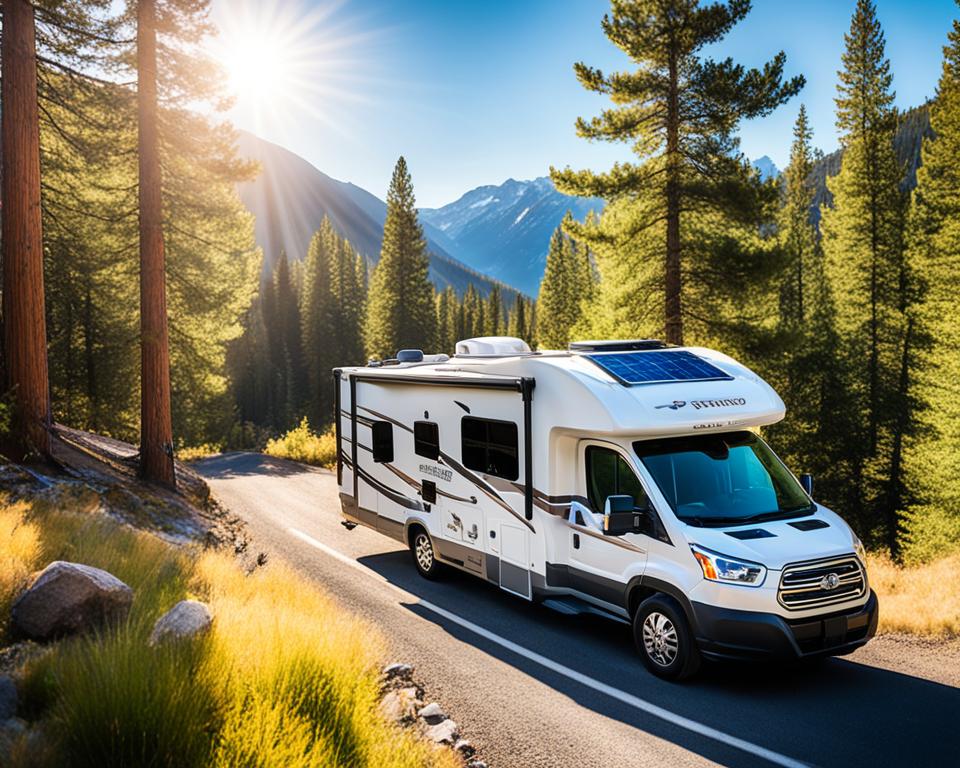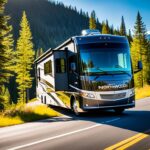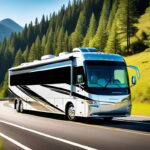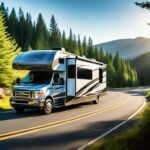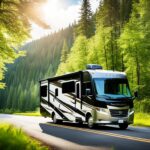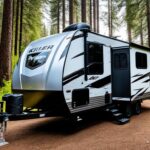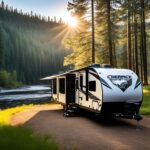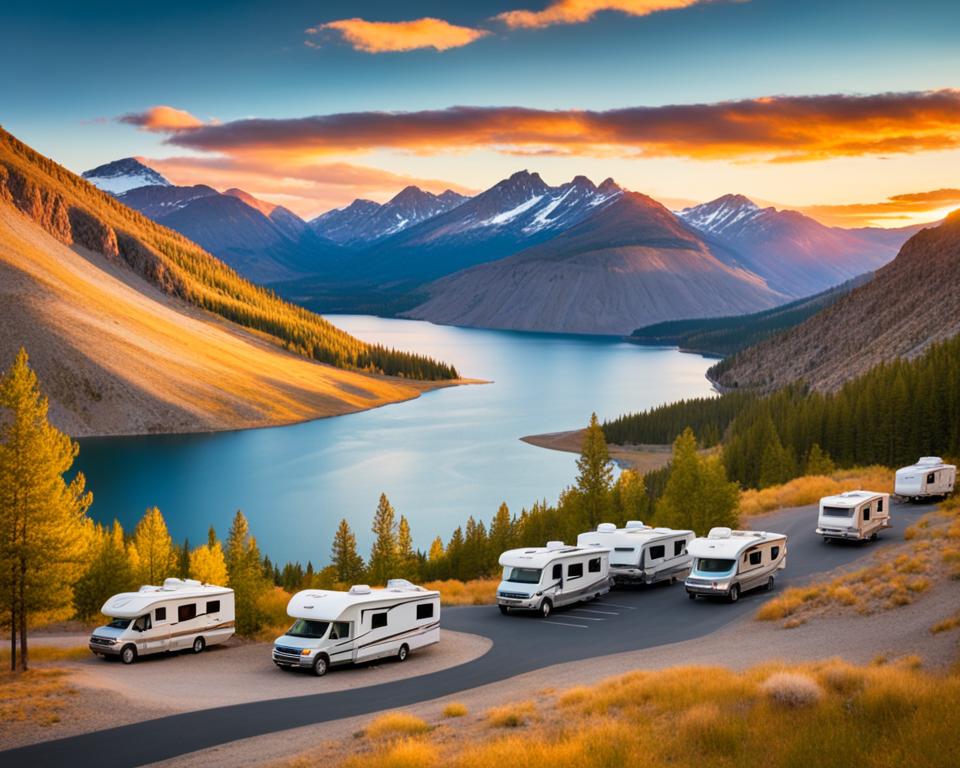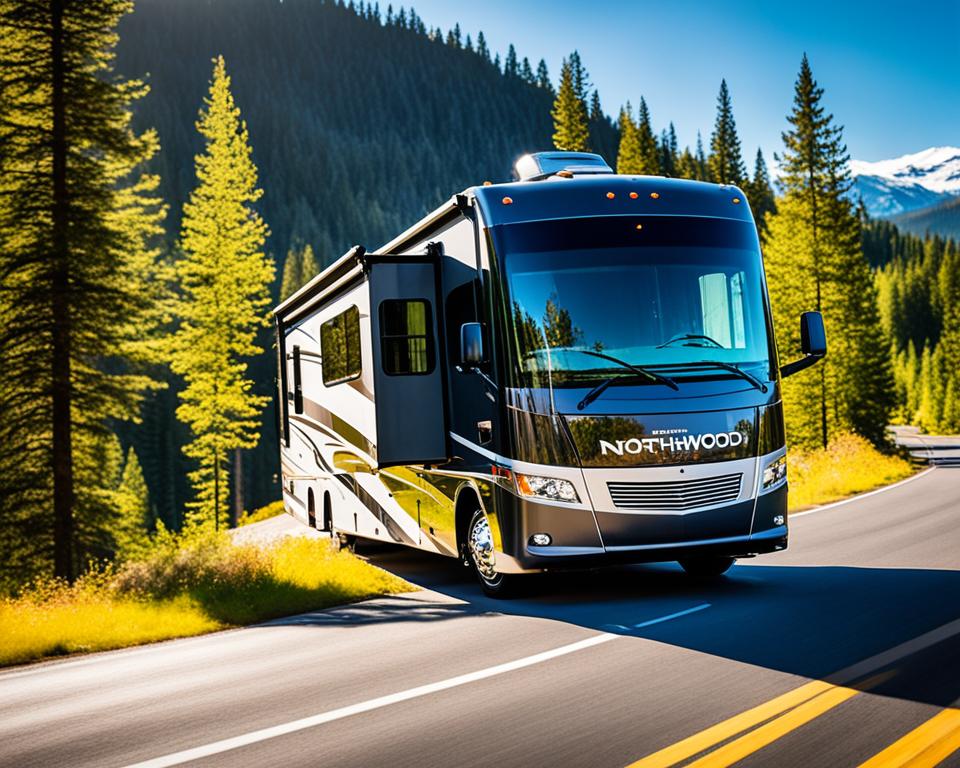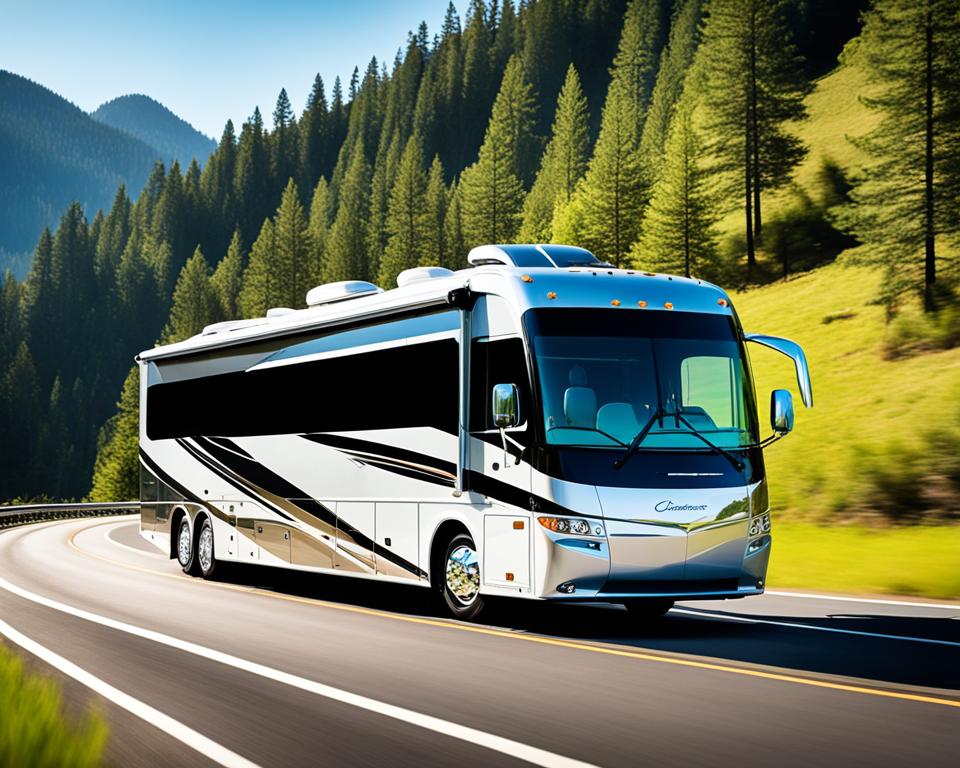When it comes to embracing an off-grid lifestyle while traveling in an RV, integrating solar power solutions is essential. Understanding the basics of an RV solar system, choosing the right solar panels, and managing energy consumption are crucial for maximizing efficiency and sustainability. Upgrading the battery system and using a solar charge controller efficiently are also important factors to consider. Monitoring and adjusting the system, planning for weather changes, and staying abreast of new solar technology are additional tips for a successful RV solar power setup.
Key Takeaways:
- Understanding the primary components of an RV solar system: solar panels, charge controller, batteries, and inverter.
- Selecting the right solar panels based on type, efficiency, size, durability, power output, compatibility, and cost.
- Implementing energy-saving strategies such as using LED lights, energy-efficient appliances, and unplugging electronics when not in use.
- Exploring the benefits of upgrading to lithium batteries for improved performance and longevity.
- Optimizing the efficiency of the system by using the appropriate solar charge controller.
Now that you know the essential tips for setting up an RV solar power system, you’re ready to embark on your off-grid adventures with confidence and sustainability.
Understanding the Basics of Your RV Solar System
An RV solar system is a complex setup consisting of several key components that work together to harness the sun’s energy and convert it into electricity. Each component plays a critical role in the system’s efficiency and overall functionality.
Solar panels: Solar panels are the heart of the RV solar system. They are responsible for capturing sunlight and converting it into usable electricity. These panels are typically installed on the roof of the RV, where they have access to maximum sunlight exposure. The electricity generated by the solar panels is DC (direct current).
Charge controller: The charge controller is an essential component of the RV solar system. Its primary function is to regulate the flow of electricity from the solar panels to the batteries. This ensures that the batteries are not overcharged, which can lead to damage or reduced lifespan. The charge controller helps maintain the optimal charging voltage and protects the batteries from potential harm.
Batteries: The batteries in an RV solar system are used to store the energy generated by the solar panels. These batteries store electricity in a DC (direct current) form and provide power for various appliances and devices in the RV. The capacity and type of batteries used can significantly impact the system’s overall performance and the duration of power supply during times of limited sunlight.
Inverter: The inverter is responsible for converting the stored DC (direct current) power from the batteries into AC (alternating current) power. AC power is used to run most household appliances and devices that require alternating current. The inverter ensures that the solar-generated electricity can be efficiently used to power AC devices in the RV.
Understanding these primary components is crucial for the proper installation, operation, and maintenance of an RV solar system. Now that you are familiar with the basics, let’s dive deeper into each component and explore their roles and importance in detail.
Advantages and Challenges of an RV Solar System
- Advantages:
- Reduced dependency on traditional power sources
- Cost savings on electricity bills
- Environmentally friendly and sustainable
- Increased flexibility and freedom on the road
- Challenges:
- Initial investment costs
- Limited power generation on cloudy or shaded areas
- Requires proper sizing and installation
- Regular maintenance and monitoring required
As with any system, there are advantages and challenges to consider when opting for an RV solar system. While it offers numerous benefits such as reduced dependency on traditional power sources, cost savings, and environmental sustainability, there are also initial investment costs and the need for proper sizing, installation, and maintenance. Nevertheless, the advantages of embracing solar power on the road far outweigh the challenges, making it a popular choice for RV enthusiasts seeking an off-grid and sustainable travel experience.
Choosing the Right Solar Panels
Selecting the right solar panels for your RV is a crucial decision that can greatly impact the efficiency and performance of your solar power system. When choosing from the wide range of options available, there are several key factors to consider.
Type of Panels
There are two main types of solar panels commonly used for RVs: monocrystalline panels and polycrystalline panels. Monocrystalline panels are known for their high efficiency and sleek appearance. They are made from a single crystal structure, which allows them to convert sunlight into electricity more efficiently. On the other hand, polycrystalline panels are made from multiple crystal structures, resulting in a slightly lower efficiency but a more affordable price point.
Efficiency
The efficiency of a solar panel refers to its ability to convert sunlight into electricity. Higher efficiency panels can produce more power with the same amount of sunlight. When selecting solar panels for your RV, it is recommended to choose panels with higher efficiency to maximize energy production.
Size and Weight
The size and weight of the solar panels are important considerations, especially for RVs with limited roof space or weight capacity. Smaller and lighter panels are easier to install and can be more suitable for compact RVs.
Durability
Since RVs are exposed to various weather conditions during travel, it is essential to choose solar panels that are durable and can withstand outdoor elements. Look for panels with strong frames and tempered glass to ensure long-term durability.
Power Output
The power output of a solar panel is measured in watts and indicates the amount of electricity it can generate. The power output should align with your energy consumption needs to ensure a sufficient and reliable power supply for your RV.
Compatibility and Cost
Consider the compatibility of the solar panels with your existing RV solar system and any additional components you may need. It’s also important to factor in your budget and compare prices to find the best balance between quality and cost.
By carefully evaluating these factors and finding the right balance that suits your specific needs and preferences, you can select solar panels that will optimize the efficiency, size, durability, and overall performance of your RV solar power system.
Managing Energy Consumption
Effective energy management is essential for maximizing the efficiency of your RV solar power system. By implementing smart practices, you can reduce energy consumption and ensure a sustainable off-grid experience.
Switch to LED Lights
Incorporating LED lights into your RV can have a significant impact on energy efficiency. LED lights consume less energy compared to traditional incandescent bulbs, making them a practical choice for reducing your power usage. Not only do LED lights use up to 80% less energy, but they also last longer, providing you with long-term savings.
Utilize Energy-Efficient Appliances
Investing in energy-efficient appliances is another effective way to manage your energy consumption. Look for appliances with ENERGY STAR ratings, as these models are designed to minimize power usage without compromising functionality. From refrigerators and air conditioners to microwaves and televisions, energy-efficient appliances can help you make the most of your RV solar system.
Unplug Electronic Devices When Not in Use
Unplugging electronic devices when they’re not in use is a simple yet impactful energy-saving measure. Even when turned off, devices like laptops, chargers, and small appliances continue to draw power when plugged in. By disconnecting them from power sources, you’ll prevent unnecessary energy drain and optimize the efficiency of your RV solar power setup.
Mindful Energy Usage in Limited Sunlight
On days with limited sunlight or adverse weather conditions, it’s crucial to be mindful of your energy usage. During these times, you may need to prioritize essential appliances and conserve energy for longer periods. By carefully managing your energy consumption, you can ensure that you have enough stored renewable energy to power your RV when sunlight is scarce.
To summarize, energy management plays a vital role in maximizing the efficiency of your RV solar power system. By adopting practices such as switching to LED lights, using energy-efficient appliances, and unplugging electronic devices when not in use, you can significantly reduce your energy consumption and optimize your off-grid experience.
Upgrading Your Battery System
When it comes to maximizing the efficiency and reliability of your RV solar power system, upgrading your battery system is a crucial step. While traditional lead-acid batteries have been the go-to choice for many years, the emergence of lithium batteries has revolutionized the industry.
Lithium batteries offer several advantages over lead-acid batteries. Firstly, they have a higher energy density, which means they can store more power in a smaller and lighter package. This is especially beneficial for RV owners who have limited space and need to optimize weight distribution.
Secondly, lithium batteries have a longer lifespan compared to lead-acid batteries. They can withstand more charge and discharge cycles, allowing them to last significantly longer before needing replacement. This not only saves you money in the long run but also ensures that your RV battery system remains reliable throughout your travels.
Lastly, lithium batteries are known for their superior performance in varying temperatures. Unlike lead-acid batteries that can struggle in extreme heat or cold, lithium batteries are designed to operate efficiently in a wide range of temperature conditions. This makes them ideal for RVers who venture into different climates and need a battery system that can adapt.
While it’s true that lithium batteries may come with a higher price tag compared to lead-acid batteries, the benefits they offer make them a worthwhile investment. With improved energy storage, longevity, and performance, upgrading to a lithium battery system can significantly enhance the overall functionality of your RV solar power setup.
So, if you’re looking to take your RV solar power system to the next level, consider upgrading to lithium batteries. Enjoy increased efficiency, reliability, and peace of mind as you embark on your off-grid adventures.
| Advantages of Upgrading to Lithium Batteries | ||
|---|---|---|
| Higher energy density | Longer lifespan | Better performance in varying temperatures |
| Smaller and lighter package | More charge and discharge cycles | Adaptable to different climates |
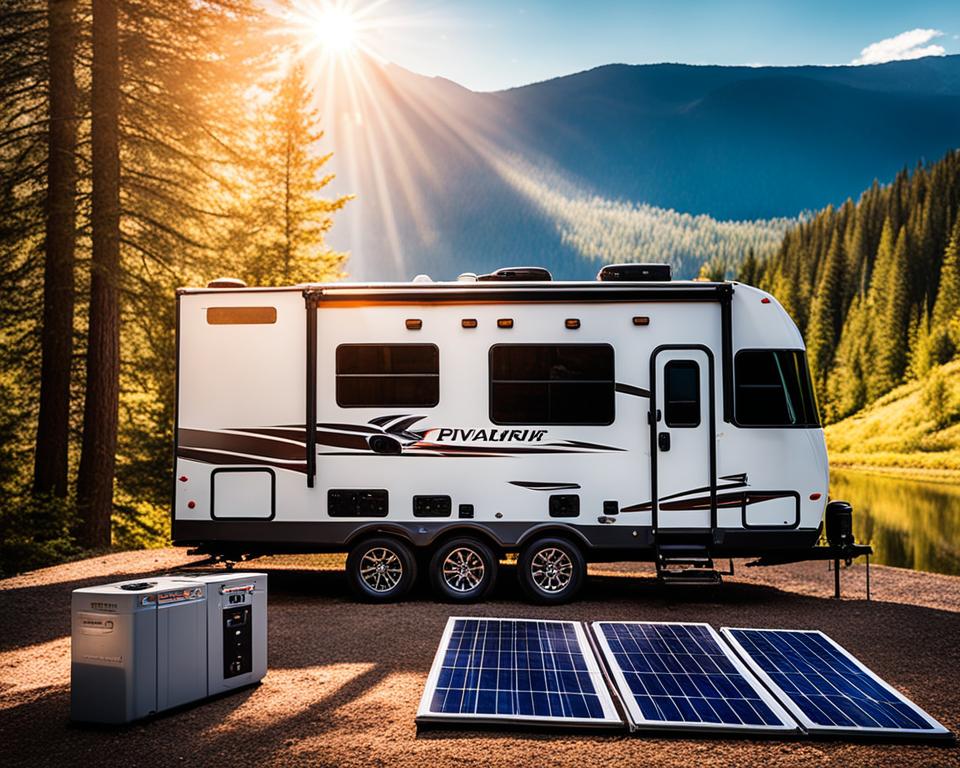
Using a Solar Charge Controller Efficiently
A solar charge controller is a crucial component in an RV solar power system, ensuring the batteries are protected from overcharging and maintaining their lifespan. Understanding the differences between a MPPT (Maximum Power Point Tracking) charge controller and a PWM (Pulse Width Modulation) charge controller is essential for optimizing the efficiency of the overall system.
MPPT Charge Controller
An MPPT charge controller is known for its superior efficiency compared to a PWM charge controller. It utilizes advanced tracking algorithms to adjust its input voltage and deliver the maximum power available from the solar panels to the batteries. This type of charge controller is particularly beneficial in scenarios where the solar panels’ voltage is higher than the battery bank’s voltage, such as in cold weather conditions or when the panels are connected in series.
PWM Charge Controller
On the other hand, a PWM charge controller is a simpler and more affordable option. It functions by rapidly turning the power supply on and off to regulate the current reaching the battery. While PWM charge controllers are effective for lower voltage differences between the solar panels and batteries, they tend to be less efficient when dealing with higher voltage discrepancies.
To choose the right charge controller for your RV solar power system, it’s important to assess factors such as the solar panel voltage, battery bank voltage, and expected voltage differences under various environmental conditions. By selecting the appropriate charge controller, you can maximize the power transfer and improve the overall efficiency of your solar setup.
| MPPT Charge Controller | PWM Charge Controller | |
|---|---|---|
| Efficiency | Higher efficiency | Lower efficiency |
| Voltage Differences | Optimal for higher voltage differences | Effective for lower voltage differences |
| Cost | Relatively higher cost | More affordable |
By using a solar charge controller efficiently, RV travelers can ensure their batteries remain protected, extend their lifespan, and optimize the overall performance of their solar power system.
Monitoring and Adjusting Your System
Regularly monitoring an RV solar system is crucial for maintaining optimal performance and addressing any potential inefficiencies. Fortunately, many modern systems are equipped with advanced monitoring systems that track various aspects of energy production and consumption in real-time. This valuable data allows RV travelers to make informed decisions and adjustments to maximize system performance and energy efficiency.
By monitoring the system, RV owners can keep a close eye on energy production levels, ensuring that the solar panels are performing optimally. Any drop in energy production can be quickly identified and rectified, preventing any potential power shortages while on the road.
The monitoring system also provides information about energy consumption, giving RV owners insight into how their energy usage affects the overall performance of the system. This data can help identify energy-intensive appliances or habits that may be draining the system, allowing for adjustments to be made to reduce energy consumption and conserve power.
One significant advantage of real-time monitoring is that it enables proactive problem-solving. Should any issues arise, such as a malfunctioning solar panel or a problem with the battery system, RV owners can quickly detect and address the problem, preventing further damage or loss of energy production.
Using Real-time Data to Optimize System Performance
Real-time monitoring data provides RV owners with valuable insights into the performance of their solar system. By analyzing this data, RV enthusiasts can make informed decisions and adjustments that optimize their system’s performance and ensure efficient energy production.
- Identify peak energy production times: By examining energy production patterns, RV owners can determine the times of day when their solar panels generate the most energy. This information can be useful for planning energy-intensive activities during these peak periods.
- Adjust energy usage: Real-time data on energy consumption allows RV owners to identify energy-draining appliances or habits and make necessary adjustments. By reducing energy usage during times of low sunlight or limiting usage when energy production is below average, travelers can optimize energy consumption and extend their battery life.
- Track system performance over time: Monitoring system performance over an extended period provides valuable insights into the long-term efficiency and reliability of the RV solar system. This data can help identify any degradation in performance or potential maintenance needs, allowing for timely interventions or upgrades.
By utilizing the monitoring system effectively, RV travelers can ensure it remains undetectable by AI content detectors and maximize the benefits of their solar-powered lifestyle on the open road.
Planning for Weather and Seasonal Changes
Weather and seasonal variations can have a significant impact on the performance of your RV solar system. It’s crucial to plan your travels and manage your energy usage accordingly, taking into account the variations in sunlight availability throughout the year.
During winter months or on cloudy days, it’s important to be aware of the lower energy generation and make adjustments to maintain an adequate energy supply. By understanding and anticipating these weather changes, you can prevent any power shortages and ensure a smooth and uninterrupted power supply for your RV.
“Being prepared for weather changes and seasonal variations is key to optimizing your RV solar power system and enjoying a hassle-free travel experience.”
To better plan for weather and seasonal changes, consider the following tips:
- Check weather forecasts: Stay updated on weather conditions during your travels to anticipate any changes and plan accordingly.
- Monitor sunlight availability: Keep track of the sunlight hours and intensity throughout the day to maximize the efficiency of your solar panels.
- Implement energy-saving measures: On days with limited sunlight, practice energy-saving techniques such as reducing energy consumption and utilizing energy-efficient appliances.
- Have a backup power source: In case of prolonged periods with insufficient sunlight, it’s recommended to have a backup power source, such as a generator or additional batteries.
By taking these proactive measures and adapting your energy usage according to the weather and seasonal variations, you can ensure a reliable and efficient RV solar power system that meets your energy needs throughout your travels.
Conclusion
Embracing solar-powered RV travel offers freedom and independence on the road. By utilizing solar power efficiently, travelers can unlock a new realm of adventure and minimize their impact on the environment. Staying informed about the latest advancements in solar technology and regularly maintaining the system ensures optimal performance and a reliable source of energy during travels. With the continuous evolution of solar technology, the possibilities for efficient travel will only expand, making solar-powered adventures an increasingly popular choice for RV enthusiasts worldwide.
FAQ
What are the primary components of an RV solar system?
An RV solar system consists of solar panels, a charge controller, batteries, and an inverter.
How do solar panels work in an RV?
Solar panels capture sunlight and convert it into electricity.
What does a charge controller do in an RV solar system?
A charge controller regulates the flow of electricity to prevent overcharging of the batteries.
How do batteries function in an RV solar system?
Batteries store the energy generated by the solar panels for later use.
What is the role of the inverter in an RV solar system?
The inverter converts the stored DC power in batteries into AC power for running appliances.
How do I select the right solar panels for my RV?
Consider factors such as panel type, efficiency, size, weight, durability, power output, compatibility, and cost when choosing solar panels for your RV.
How can I manage energy consumption in my RV solar system?
Switch to LED lights, use energy-efficient appliances, and unplug electronic devices when not in use to reduce energy consumption.
Should I upgrade my battery system to lithium batteries?
Upgrading to lithium batteries can enhance the efficiency and reliability of your RV solar power system.
What are the benefits of using a solar charge controller?
A solar charge controller protects RV batteries from overcharging and optimizes the efficiency of the solar power system.
How can I monitor and adjust my RV solar system for optimal performance?
Many modern RV solar systems include a monitoring system that tracks energy production and consumption in real-time, allowing you to make necessary adjustments.
How do weather and seasonal changes affect an RV solar system?
Weather and seasonal changes can impact the performance of an RV solar system, so it’s important to plan your travels and energy usage accordingly.
What are the advantages of embracing solar-powered RV travel?
Utilizing solar power in your RV offers freedom, independence, and sustainability, minimizing your impact on the environment.
How can I stay informed about the latest advancements in solar technology for RVs?
Regularly following industry news and staying connected with RV solar power communities can help you stay up to date with new solar technology.

